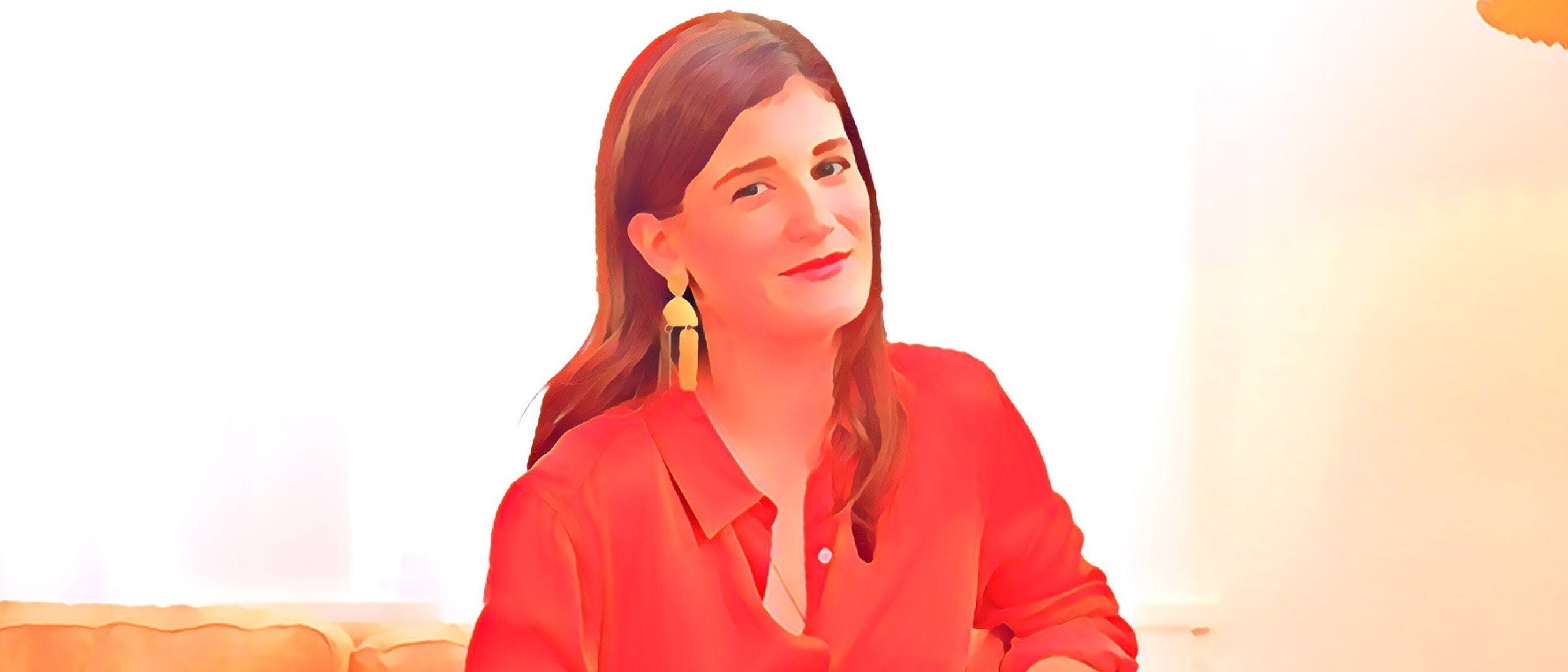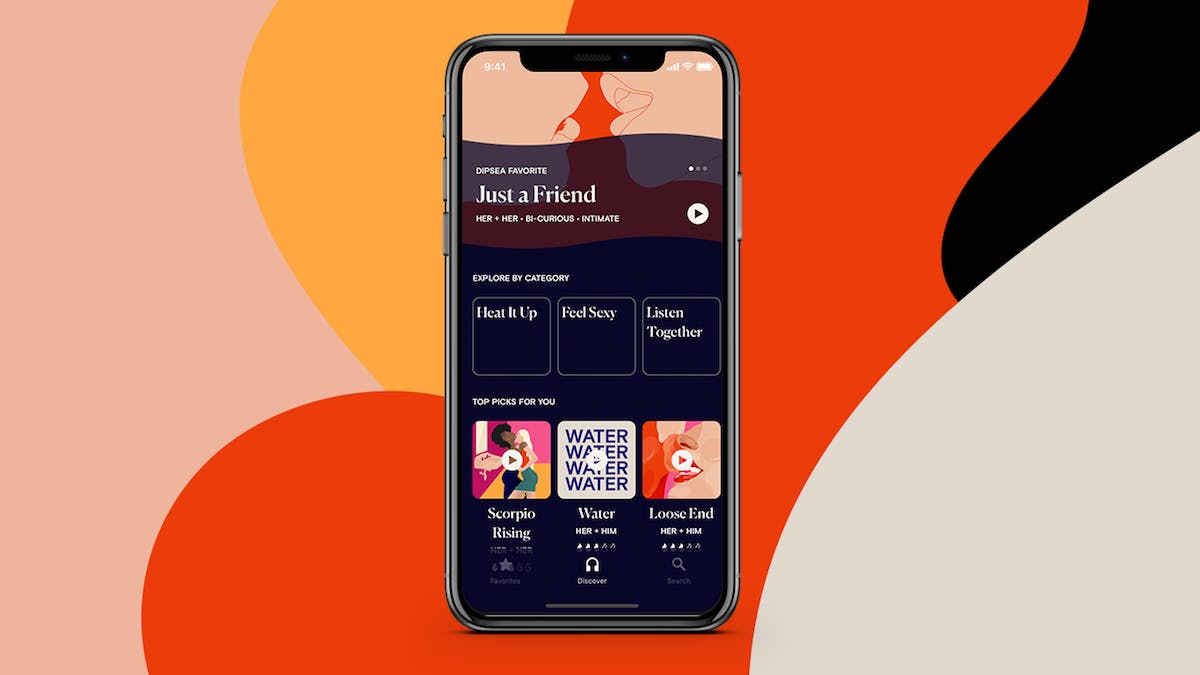Q&A: Lessons Building an Audio App Designed to Turn Women On

Share On
"We feel validated knowing we’re making something that people want to talk about."
Dipsea is on a mission to get women in the mood.
While porn is still a taboo subject for many women, Dipsea's founders saw an opportunity to create sexual content specifically for women when they launched their app of erotic audio stories last December.
The app's library of stories use “mental framing” — or scenario conjuring — to turn women on, and range from sexy narratives to non-narrative guided clips. All of the stories are made in-house with the startup's network of freelance writers and voice writers.
Similar to meditation apps like Headspace or Calm, Dipsea uses a subscription based model ($8.99 per month or $48 per year) to make money, as auditory erotica doesn't really lend itself to ads.
We talked to Dipsea founder Gina Gutierrez about why she decided to build the app and what she's learned building an unconventional product.

What was the *aha* moment that made you realize Dipsea needed to exist?
My co-founder Faye and I are part of a group of friends who are pretty open about sex. The very first time we got on the subject of fun, sexy content it became obvious that there was actually very little of it. Faye had read “Outlander,” and we talked about sharing STARZ passwords to watch the show. Someone had a chapter dogeared in their nightstand since 12th grade. I thought it was so interesting that these women who are curious and explorative weren’t finding what they were looking for.
Then one day I was listening to Headspace, and I had this revelation that guided audio has a lot of potential beyond building the practice of meditation. It has the power to really change how you feel. Audio is an incredible medium for erotica because sexuality is so psychological and so sensory — especially for women. Suddenly, the conversations around Faye’s kitchen table wasn’t “Why isn’t there more amazing sexy content for women?” but rather “Why isn’t it audio?” and “Why hasn’t anyone done this yet?” We decided to be the ones to do it.
What was your launch strategy?
Faye had experience building products, and I had experience building brands. But neither of us had any experience creating erotic content, let alone in audio. And Dipsea was too new of a concept to ask women for feedback in the abstract. They’d respond, “Yeah that sounds really cool, but I guess I’d have to listen!”
The first step was to see if we could produce a handful of stories ourselves, and to see if people actually liked them. In January 2018, we bought a mic, reached out to our networks to find voice actors, partnered with sound designers, and created the first couple of audio stories as part of an alpha. When we saw great response and shareability with six audio files hosted on a simple website, we were encouraged to take the next step and build an app.
We decided to build an app for a few reasons. An app gives us full control from content creation to delivery, meaning we can really create an amazing user experience. It lets us offer ad-free listening. And it creates a single destination — an answer for where to go in a space with little consolidation and few brand players.
We hired a core team, developed several dozen stories, and released them on a beta app that we built in-house. It was the first time we were able to get broader feedback not only on what women and their partners liked about the stories, but what was working and what wasn’t about the app experience.
We launched publicly in December 2018 and the more listeners we get, the more we understand what they want. It’s been an exciting few months to say the least!
What was the hardest part of preparing to launch? What new skills did you have to learn?
Whew! Lots of things were hard, it was a year of incredible learning and growth for all of us.
1. Navigating two truths: that you know best, and that you know very little. As a pre-launch startup founder, you’re doing a lot of work to convince people that your idea isn’t crazy. It’s a lot of projecting confidence, communicating persuasively, having quick answers ready. But on the other hand — especially as a first-time founder — you’re doing almost everything for the first time. You definitely don’t have all the answers. It’s important to learn to accept and navigate those two truths. Ask for help or admit your lack of expertise when it’s in your best interest to do so.
2. Accepting advice judiciously. When you do open up the floor for advice, you have to remember that you don’t have to (and can’t) take all of it. Everyone will have a perspective on your business: what will work, what to avoid, which benchmarks are relevant. It’s up to you to decide what advice aligns with your vision and who has the experience you’re willing to make a bet on. Going against someone’s advice isn’t an insult, it’s part of being a leader and critical to moving forward.
3. Realizing that success isn’t formulaic. I think there’s a startup illusion that you’ll ‘strike gold,’ so to speak. Figure out how to make something irrefutably awesome and then you’re done, rinse and repeat. There might be business models that make this easier, but content isn’t one of them. It’s a very complex, nuanced process to make a Dipsea story, and every story brings different challenges. We make important, subjective calls around how to reflect sexuality positively, make our listeners feel comfortable, and create fantasies that feel really sexy and exciting. Then, we listen to user data and learn what we did and didn’t get it right. It’s hard work a high bar that will get you to success, not a magic formula.
When did you feel your idea for Dipsea was validated?
As the makers of female-targeted product focused on sexuality, successfully raising VC funding was one type of validation. Early on, we had a respected VC tell us that “Dipsea just isn’t a venture-backable business,” and we’d seen other founders in our space struggle to raise money. The funding was exciting because it indicated that the cultural zeitgeist around female empowerment had reached a tipping point. It validated that a business like ours could operate in the commercial domain and become mainstream. Another type of validation — and one that my co-founder and I will tell you is more satisfying — are the personal stories we hear from our listeners.
Hearing women say that Dipsea ignited their sexuality and couples say that Dipsea fundamentally improved their sex lives was incredible. And it feels like the momentum is building. A friend told me a stranger in a calligraphy workshop recommended Dipsea to her. An acquaintance told us Dipsea was the topic of conversation in an MBA class at Wharton. We feel validated knowing we’re making something that people want to talk about.
What’s something you’ve unintentionally discovered while building Dipsea?
When we first started producing Dipsea stories, we said that we wanted every portrayal of sex to be safe, consensual, and positive. That can be difficult because sex is so deeply personal and there’s a lot of gray areas. But we knew we wanted to model sexuality in a way that would make people feel like safety and respect are paramount.
What we realized is that this isn’t just a personal mission, but a user demand. A condom’s appearance in a story isn’t a disruption of the mood, it’s a detail listeners tell us they appreciate. People are demanding their brands and the media to become more fluent in the language of consent. It’s been exciting to realize that our good intentions are also good for the business.
How did your first customers find you (beyond friends/family/people you already knew)?
We’ve seen great coverage on our launch in places like Marie Claire, Refinery29 and Vox. Some early users found us via our Instagram account, others from the App Store. And word of mouth!
What habits help you stay productive as a Maker?
There’s no such thing as an unproductive reading habit. And what I mean by that is, put down the management training book you don’t actually want to read and pick up The Atlantic article that caught your eye or the bestselling novel with the beautiful cover at the airport. As a maker, you’ll find inspiration in other’s content and ideas—and you’ll pick up sound bytes and metaphors that will elevate and contextualize your explanations of your work.
What’s been the most rewarding moment building Dipsea so far?
I once told a friend that having a radical positive impact on a handful of people’s lives interested me more than nominally improving a million people’s lives. In hard times as a founder and as a CEO, I thought back to that moment and wondered, “Am I on the right path?”
We’ve since had users say we’re changing their relationships with themselves and their partners, and had employees tell us that this is the best job they’ve ever had. At Dipsea we have a real opportunity to affect people at two levels, each meaningful to me in their own way. But building something as new and important as Dipsea alongside such thoughtful, creative people, and empowering them to do their best work, has been indescribably rewarding.
What advice would you give Makers who want to build something that challenges convention (like Dipsea)?
F*** the haters. Just kidding! Conventions exist because going with the status quo is a lot easier than fighting it. If you’re choosing to challenge conventions, you’re choosing the harder path. So be kind to yourself and remember that the very fact that you’re encountering resistance is proof you’re onto something big.
Comments (2)
Alice Wonderson@alice_wonderson
I love this Q&A about building an audio app with a unique purpose. It's fascinating to see how technology is used to cater to specific audiences. Speaking of services tailored to specific needs, if you ever require academic assistance, you can explore the option of using the best essay writing services available online that can help students achieve academic success while addressing their unique requirements. Using innovation in both technology and education can open great opportunities.
Share
Absolutely delighted with the content here! It’s refreshing to find such engaging and insightful posts. Before I celebrate a significant milestone like marriage or a birthday, I’m planning something new and exciting. I’ve heard fantastic things about SEVlaser and their services, especially their Laser Hair Removal in Houston. I’ve read other positive experiences and felt compelled to share my enthusiasm. Highly recommend booking a session with them as a thoughtful gift for yourself or a loved one!
More stories

Mathew Hardy · How To · 3 min read
How to Detect AI Content with Keystroke Tracking

Sanjana Friedman · Opinions · 9 min read
The Case for Supabase

Vaibhav Gupta · Opinions · 10 min read
3.5 Years, 12 Hard Pivots, Still Not Dead
Kyle Corbitt · How To · 5 min read
A Founder’s Guide to AI Fine-Tuning

Chris Bakke · How To · 6 min read
A Better Way to Get Your First 10 B2B Customers
